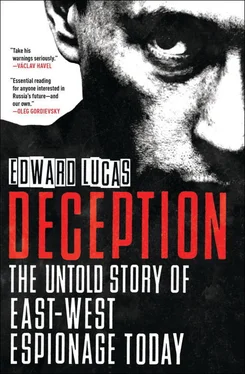The danger of distraction is clear: Edbrook’s paper cites a CIA agent who spent four years building a cover story by attending a university in order to gain a job as a salesman in a particular target area. He then lost interest and resigned. This certainly seems to have been the case with some of the Soviet-era illegals sent to America on long-term deep-cover missions during the Cold War. Eventually unearthed thanks to the Mitrokhin archive, they proved to have done very little or no spying, and in some cases had lost contact largely or wholly with their controllers. Edbrook continues:
The rational preparation and conduct of an operation can therefore have no other guide than its purpose, and this purpose must therefore be defined at the outset… A deep-cover mission is not justified if it can do no better than wander along the fringes of an intelligence target, eliciting scraps of information and misinformation, or ‘collect information available in the normal course of cover work and spot potential agent material.’ [28] ab Mr Edbrook is presumably quoting from another CIA document not yet declassified.
It is wasteful to have a deep-cover agent doing the routine jobs that can be done just as well by an official-cover man or his ordinary local agents and informants. The targets that call for deep cover are those to which official government representatives lack access or in which they must conceal their interest or from which only an independent channel will elicit information not meant for official consumption.
Thinking in the spy world has moved on a bit since this, exploiting the increasingly blurred boundaries between government service and life outside. Thomas Patrick Carroll, a former American intelligence officer turned academic and security consultant, has coined the term ‘natural capacity’ for a kind of spying which is self-financing, ubiquitous and effective. He posits the following scenario: America wishes to know about the people, materials, finances and political associations of an international airport in the Middle East. The traditional approach would be to post intelligence officers, probably under official cover as diplomats, to recruit the necessary sources. Under ‘natural capacity’ the CIA would have at the airport an authentic, profitable private firm, backed by real investors. It could survive any amount of scrutiny, and would provide anything that policymakers needed to know about the airport. ‘Natural capacity’ could also include a mining company searching for mineral deposits in Afghanistan, or an NGO [29] ac I think this creates horrific problems for real NGOs and should be off-limits.
providing mobile hospital services with access to remote parts of the Philippines where extremists lurk. 11
Mr Carroll’s speculative account of a desirable future for American intelligence sounds uncannily like the way that Russia behaves already. Its energy companies, banks and other commercial, journalistic and academic outfits give it ‘natural capacity’ of a kind that British or American spymasters for now can only dream of. Ms Chapman’s hybrid identity in the West – genuine in every respect but her intentions – fits into that well. But Russia’s spymasters have also shown they can use human and financial resources the old-fashioned way, by running deep-cover illegals. It is hard to see how Western services can match that, even if they wanted to. For a couple plucked from Tomsk in the 1980s Soviet Union, a move to the West under an illegal identity probably seemed like a good career move – and so it must have appeared to the illegal ‘Donald Heathfield’ and his wife Ann Foley, who were originally from Tomsk but who spent twenty years living undercover in the West. The other way round looks less attractive. It is hard to imagine the CIA recruiting two able graduate students in Wisconsin or Kansas for a twenty-year mission living undercover in Siberia. Yet the fact that something is illogical or undesirable from a Western point of view does not mean that a Russian decision-maker would see the issue in the same way. Blessed by natural abundance, and with Soviet-style thinking still lurking in the background, Russia tends towards extravagant use of resources of all kinds.
The illegals’ controllers in Moscow may well have been wasteful in using their assets’ costly and carefully designed cover. One of the illegals in America, ‘Cynthia Murphy’, was asked to collect information about the world gold market. Any competent trader or banker in Moscow could have done that without needing any clandestine cover. Decision-makers in all countries tend to overestimate the value of secret information, Russians more than most. It may well be that these illegals wasted time satisfying their masters’ fetish for material marked ‘secret’, which in fact contained little that was not available from open sources.
Amused complacency, however, is not the media’s usual response to, say, the leak of toxic industrial waste. Even if the discharge does not prove damaging, it focuses attention on the physical or procedural flaws that caused it. The arrest of the illegals showed that American public life was wide open to penetration and that Russia has put substantial resources over many years into trying to exploit that weakness. Why was nobody worried? A big reason was the FBI’s clever news management. It is often said that spies like the shadows. But like any outfit dependent on taxpayers’ money and politicians’ willingness to spend it, intelligence and security services pay careful attention to their image: in their case as mysterious, austere and self-sacrificing guardians of the ultimate national interest. Though they do not hold press conferences or run advertising campaigns, they use nudges and winks, discreet briefings of selected journalists deemed ‘sound’; and the occasional release of carefully honed material to the wider public.
This clashes with an operational need: to mislead the other side. Crowing about successes risks endangering sources and methods. Keeping silent about them risks giving an impression of idleness and incompetence. Britain’s Secret Intelligence Service (the official label for MI6) was thrilled to have smuggled Mr Gordievsky to Finland. The temptation to show off a brilliant piece of tradecraft was great. But once you explain how a diplomatic car picked up your fugitive from a remote rural bus stop and took him across the border in a heat-insulated baggage compartment, you will be less likely to pull the trick off again. The same principles apply to disasters. If you are penetrated or betrayed, then owning up to the damage risks giving the other side some clues about what they achieved – and failed to achieve. Some spy services never prosecute traitors for just this reason. Those who are caught are quietly retired or shifted to other jobs, leaving the other side guessing whether their asset was blown, or was just the victim of a random bureaucratic shuffle.
It is against this background that all the public information relating to the detained illegals such as Ms Chapman must be judged. The American authorities weighed every line of the criminal complaints they issued against the arrested spies. Clearly, it was necessary to provide enough information to crack the defence of those arrested, leading to an immediate admission of guilt. The American authorities did not want to risk a trial in which FBI agents could have been subject to embarrassing and potentially damaging cross-examination about sources and methods. Another priority was to cause maximum annoyance and confusion to the Russian side, chiefly by making the ‘damage control’ effort as painful, costly and disruptive as possible. That meant overstating what the American side didn’t know, and understating what it did. In the world of mirrors and mind-games, planting doubts is a powerful offensive weapon. Exaggerating the time during which the spies were under surveillance, for example, discredits everything they did in their bosses’ eyes. A cardinal principle of intelligence work is that anything provided by a compromised source must itself be considered as compromised. The farther back in history that the taint goes, the bigger is the area of contamination. Similarly, the Americans may not have succeeded in intercepting and decoding everything sent from Ms Chapman’s laptop. [30] ad Ms Chapman and another junior illegal ferried laptop computers between Russia and America, rather more often than planned because of repeated technical glitches. When they worked, the laptops were used to send clandestine radio transmissions to intelligence officers based at Russian diplomatic missions.
But the Russians cannot be sure. If burst transmissions over ad-hoc networks between nearby laptops are hard to monitor then it would be a neat counter-measure to mention them frequently in the criminal complaint. It will be a bold Russian spy who includes them in his operational planning in future. A correctly concocted mixture of overstatement and ambiguity will cast a corrosive cloud over Russian intelligence operations for years.
Читать дальше












